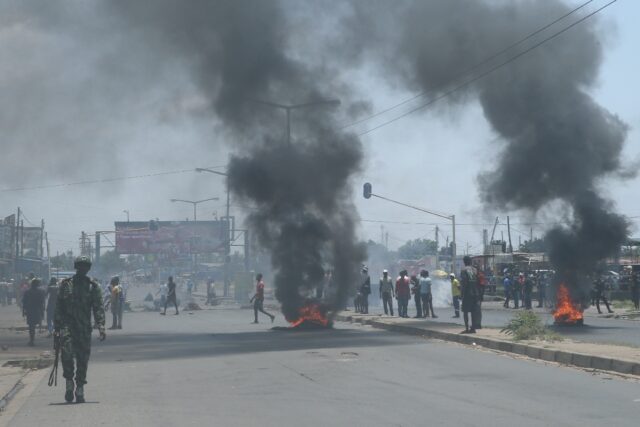Mozambique’s highest court confirmed Monday the ruling party’s victory in a disputed October vote after allegations of rigging triggered weeks of deadly street clashes.
Fears are high in the country and abroad that more violence could break out in the southern African nation after the opposition threatened to call an uprising following the decision.
The United States called for calm after the Constitutional Court said the ruling Frelimo party presidential candidate Daniel Chapo secured 65 percent of the vote, revising down provisional results from the electoral commission which said he got nearly 71 percent.
Chapo’s main challenger, exiled opposition leader Venancio Mondlane, received an upward revision to 24.2 percent of the vote.
The final results extend Frelimo’s half-century grip on power and lines up Chapo to take over from President Filipe Nyusi whose second term ends on January 15.
Mondlane has said that the election was rigged in favour of Frelimo and that a separate count shows he won enough votes to take office, which he intends to do.
Several international observer missions have also said there were irregularities.
In Washington, US State Department spokesman Matthew Miller said there was “a lack of transparency” about the results and urged all parties to “refrain from violence and engage in meaningful collaboration to restore peace and foster unity”.
Conciliatory
In his first speech after being declared winner, Chapo struck a conciliatory tone, promising to reach out to Mondlane, who has been in a self-imposed exile.
“For our development we will continue to talk to everyone,” said Chapo, a former provincial governor with no experience in national government.
Mondlane has been in exile since the assassination of his lawyer on October 19, a killing he blames on security forces, and it was unclear if he intended to return.
In address on social media after the court announced the result, the 50-year-old said that he would continue his fight for the “electoral truth”.
“The Mozambican people demand that we remain firm, that we don’t stop our struggle and that we remain united and strong,” said Mondlane, who appeals to disenchanted younger voters in a country of 33 million people marked by poverty despite its abundant resources.
Before the announcement, he vowed to bring the country to a “new popular uprising at a level never seen before”, should the council endorse Frelimo as winner.
Maputo was tense ahead of the announcement, with main roads deserted and the metal curtains of stores lowered. Protesters set fire to tyres early in the evening but dispersed after a heavy rainfall.
Country on edge
Mozambique has been rocked by unrest since the election commission said that the October 9 vote was won by Chapo.
At least 130 people have been killed in two months of violence, most of them opposition demonstrators shot by security forces, according to local NGOs.
Cities, mines, borders and ports have been affected by protest action and operations at the main border with South Africa halted, causing its neighbour major losses in exports.
The US government on Thursday raised its warning level against travel to Mozambique before the council’s announcement.
Pope Francis called Sunday for dialogue and goodwill to “prevail over mistrust and discord” in Mozambique.
The protests have been the “most dangerous” ever seen in Mozambique, said analyst Borges Nhamirre, continuing despite deaths and arrests, and intensifying with police stations and Frelimo offices torched.
“I’m convinced that if Monday the Constitutional Council declares the election as free and fair, which I am 100 percent convinced it will, then the blood is going to flow,” Maputo-based political and security risk analyst Johann Smith told AFP.
“The whole game changes on Monday,” said Smith. “It will be a lot more intense and bloody.”
Mondlane had awakened resentment against Frelimo, he said, similar to discontent that this year led to the party that governed Botswana since independence being voted out and threatening to do the same in Namibia.
“It’s almost like the Southern African Spring,” Smith said, in a reference to the Arab anti-government protests in North Africa in the early 2010s.

COMMENTS
Please let us know if you're having issues with commenting.